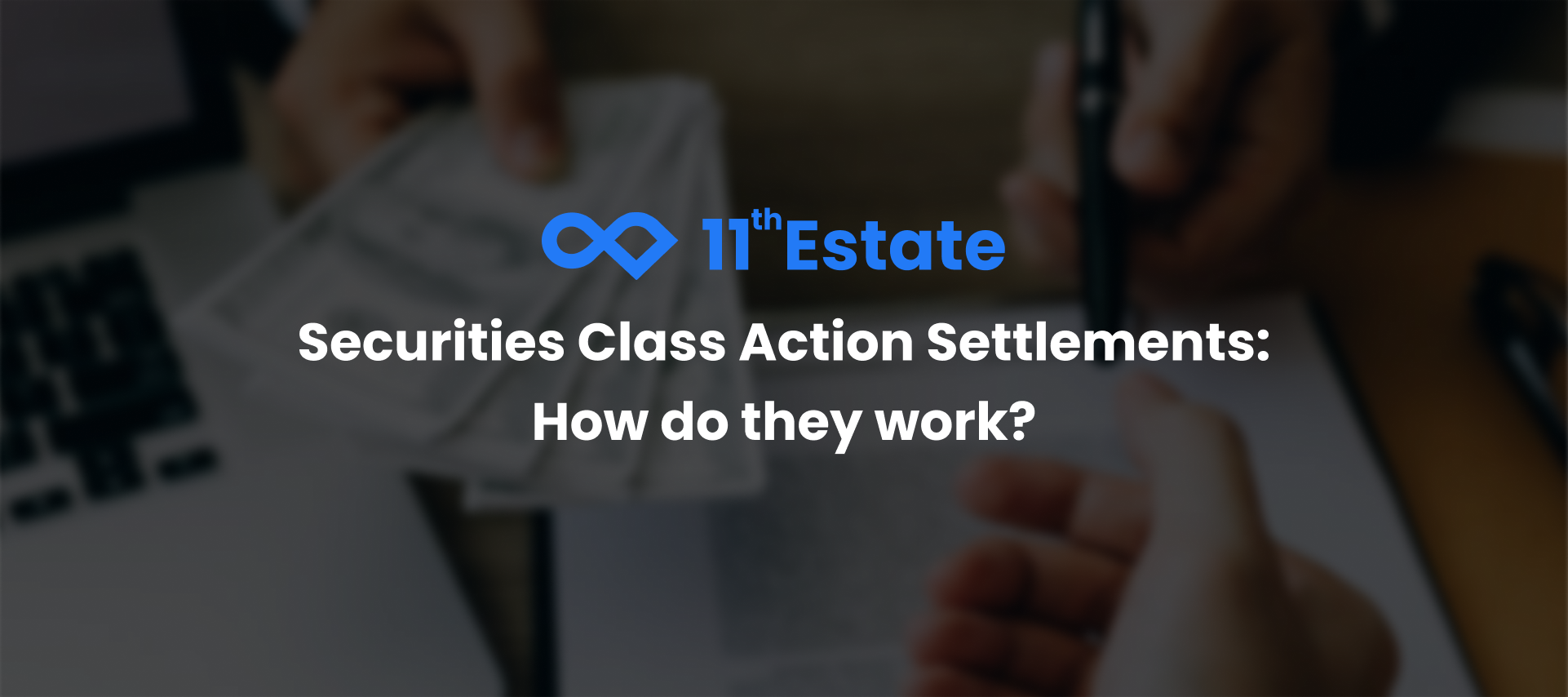What are the securities class action settlements?
When a company goes public, it must provide clear and reliable reports to its investors. This includes full disclosure of relevant information that directly impacts the company’s success, future prospects, and investors' decisions.
However, some companies may hide or share inaccurate information. They might make overly optimistic statements and keep unfavorable facts hidden to drive up their stock prices artificially.
After that, when the truth comes out, and the company's actual situation is revealed, the stock price usually drops, causing significant losses for investors.
In these cases, investors can file a securities class action lawsuit (SCA) on behalf of everyone affected. Many of these cases end in settlements, providing investors with payouts.
In 2023 alone, $8.1 billion was settled with investors in such actions. However, over 75% of eligible investors don't receive their compensation simply because they are unaware of it or believe the process of claiming their payout is too complicated.
Where do these settlements come from?
After investors file a lawsuit, the legal process starts. The first step is finding a lead plaintiff to represent their interests in the case. After that, the lawsuit usually goes through a lengthy resolution process before both parties decide to settle.
Typically, around 50% of these lawsuits end in settlements. At 11thEstate, we track all current settlements and cases so you can easily check the ones relevant to you on our platform.
The settlement process
Just like the initial lawsuit, a settlement goes through several stages. These usually depend on court approval, agreement details, and other factors. Let's take a closer look at each step.
Company and investors reach an agreement
The first stage of a settlement, called the tentative stage, occurs when both sides agree to resolve the issue. While the specific details aren't yet known, both parties have agreed in principle to settle the case.
During this stage, you can already submit your claim for compensation on 11thEstate. You'll be notified about all the details in the later stages of the settlement.
Stipulation of Settlement
After agreeing in principle, the parties will need to finalize all settlement terms and file a Stipulation of Settlement with the court. This document outlines the total settlement amount, average payout per share, deadlines, and other important details.
The approval of the settlement
Once the court reviews and approves the Stipulation of Settlement, the settlement moves into an approved stage. This approval means the court has confirmed all terms and conditions outlined before.
Filing claims
After the Stipulation of Settlement is approved by the court, 11thEstate will process your claim:
- Audit the claim to meet court requirements;
- Prepare documents for your payout;
- File a claim with the settlement administration;
- Correspond with the settlement administration to resolve any issues;
- Deliver payout directly to your brokerage account.
Another reason only a small number of investors collect their payouts is due to filing mistakes. In some cases, about 60% of claims are rejected because of these errors. At 11thEstate, we resolve all issues beforehand, ensuring that 100% of claims filed through us are accepted.
Despite every eligible investor having the right to claim compensation, statistics show that only 25-30% of investors actually file claims. As mentioned, it is often because many investors find the process too complicated, are unaware of settlement opportunities, or believe the payouts are too small to be worth the effort.
Since only a quarter of eligible investors file claims, those who do can receive up to four times the average payout per share. For instance, if the average payout per share is $1 and only 25% of investors file claims, you could receive $4 per share.
It's also important to note that a settlement resolves some past disputes between investors and the company. Therefore, it doesn't directly impact the company's current state, and investors don't lose their stocks or other securities when filing a claim.
Late claims
When you submit a claim, there's typically a deadline for filing it. However, even after this deadline passes, it's often possible to file a late claim, sometimes several months later.
In this case, the court decides whether to accept late claims when approving how payments are distributed, but all such claims are usually accepted.
Payout distribution
Depending on court decisions, the entire payout distribution process usually takes between four to nine months.
If you file through 11thEstate, compensation is directly deposited into your brokerage account.
You can also link your portfolios to automatically scan for eligible settlements and be updated on potential claims.
Why is it important to participate in the settlements?
Understanding and participating in SCAs is essential for investors who have suffered losses due to misleading corporate statements.
At 11thEstate, we aim to simplify this process, making it easy for investors to claim their rightful compensation without dealing with complicated filing procedures.
Currently, over fifty companies are paying settlements. You can check all of them on our website or connect your portfolio to avoid missing any you might be eligible for.
%%type:order-card,id:1137%%
%%type:order-card,id:1096%%
%%type:order-card,id:785%%
%%type:order-card,id:1249%%









